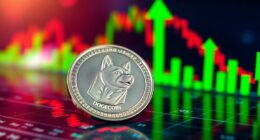You might've noticed that Dogecoin's community isn't what it used to be. Engagement is dropping, and social media buzz is fading fast. Investors are growing wary, and many are even betting against DOGE. With fewer updates and the spotlight shifting to other cryptocurrencies, it begs the question: can Dogecoin revive its former appeal, or is it truly on the decline? The answer might surprise you.

As interest in cryptocurrencies evolves, the Dogecoin community is showing signs of decline. You might've noticed that social media mentions of Dogecoin have dropped significantly, reflecting a waning excitement around this once-popular meme coin. With fewer people discussing it, the overall sentiment has shifted from enthusiasm to a more negative outlook. This decline in social volume suggests that investors are increasingly skeptical about Dogecoin's future.
Trading volumes have also taken a hit, plummeting compared to the peaks seen in previous years. This drop signals that many investors are losing interest and opting for cryptocurrencies that promise more tangible applications. With the market becoming more competitive, you'll find that investors are gravitating toward projects that offer real utility, rather than riding the coattails of a meme coin. As the focus shifts, Dogecoin's lack of significant technical updates only deepens doubts about its long-term viability. Additionally, negative market sentiment has been reported by analysts, further highlighting the community's concerns. Notably, Solana's market cap shows significant upward trends, attracting attention away from established coins like Dogecoin.
Market volatility, particularly influenced by Bitcoin's performance, further complicates Dogecoin's situation. You may find that the bearish sentiment surrounding Dogecoin is part of a broader trend affecting the entire crypto landscape. With global economic uncertainty and stricter regulations looming, many investors are understandably cautious.
While celebrity endorsements can spark short-term interest, figures like Elon Musk can't sustain growth without solid foundational developments.
Price fluctuations have been severe, too. Dogecoin has lost up to 40% of its value during turbulent market periods, and over half of traders are now shorting DOGE, reflecting a lack of confidence in its immediate recovery. Interestingly, large-scale investors—often referred to as whales—are still accumulating DOGE during these downturns, hoping for a rebound. This historical resilience suggests that despite the current challenges, Dogecoin isn't entirely out of the race.
However, it's crucial to recognize that Dogecoin's future depends heavily on social media buzz and the influence of celebrities. Without clear use cases or practical applications, long-term investors may hesitate to commit. The rise of alternative cryptocurrencies boasting more substantial offerings poses a significant challenge to Dogecoin's market position.
While it's faced declines before and managed to recover, you have to wonder: Are Dogecoin's golden days truly in the past, or can it find a way to reclaim its former glory?









